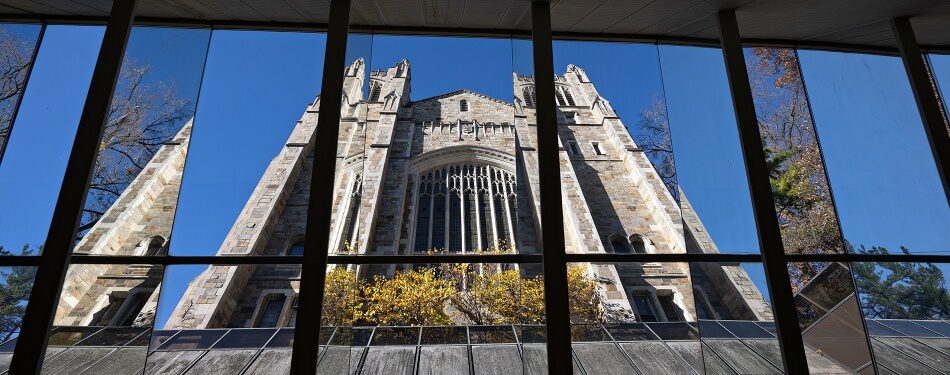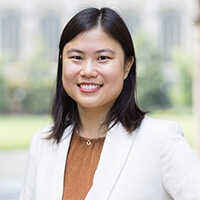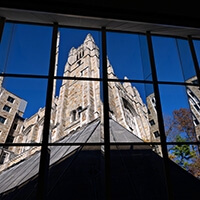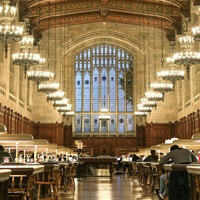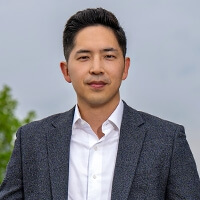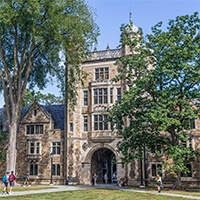Michigan Law’s Dow Sustainability Fellowship program, administered by U-M’s Graham Sustainability Institute, recently named its 2025 class of fellows. Among the 32 graduate students selected across 12 U-M schools and colleges are two second-year Michigan Law students, Libby Antonneau and Josh Bretthauer.
The program fosters the next generation of sustainability leaders, offering each recipient a $25,000 stipend, supplementary project funding, professional development opportunities, and experience working first-hand with external organizational partners.
“We are incredibly grateful for Dow’s continued generosity and partnership,” said Jennifer Haverkamp, Graham Family Director of the Graham Sustainability Institute and a professor from practice at Michigan Law.
“Our partnership aligns with U-M’s Vision 2034 strategic plan, fostering synergies that advance shared goals and highlight the commitment of both institutions to addressing complex sustainability challenges.”
Meet the Law School’s Dow Sustainability Fellows
Libby Antonneau, 2L
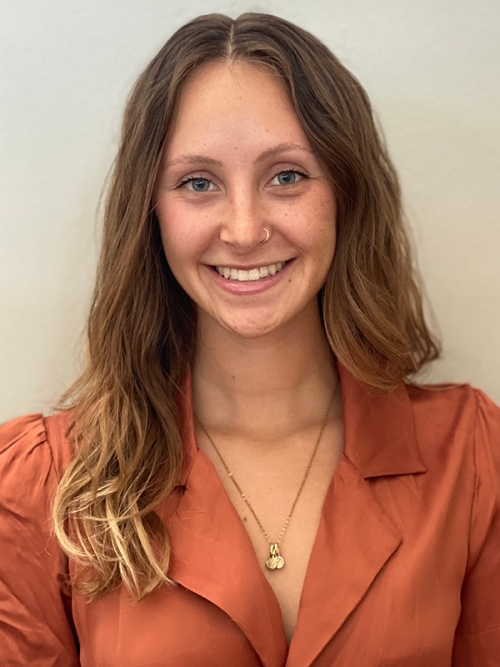
In collaboration with the National Wildlife Federation, Antonneau and a team of U-M students will research critical mineral extraction in the US on private lands. As the only law student on the team, she will oversee the legal and policy side of the team’s analysis of mineral extraction.
“I’m eager to meet students outside of the Law School who are also interested in environmental sustainability,” she said. “This fellowship offers a unique opportunity to practice working with people with a different expertise than me, which is an extremely valuable skill for working in the field of environmental- and energy-related law.”
Antonneau grew up in Southeastern Wisconsin, where there is an abundance of natural resources. She majored in environmental studies as an undergrad and completed an energy certification. Through both experiences, she knew law school was the right direction for her academic career.
“I realized with my love for the outdoors and my experiences in college that I want to work on climate change and environmental justice,” said Antonneau. “I am interested in helping facilitate the clean energy transition and ensuring the process is just.”
She is a membership chair for the Environmental Law Society (ELS), which has helped her connect with a larger sustainability community. In her fellowship, Antonneau is most looking forward to engaging with real-world environmental and sustainability issues while still in school.
“I’m grateful for the opportunity; I knew I wanted to study environmental law when I came to law school, so it’s exciting for me to be able to work on projects that align with what brought me here in the first place,” she said. “It’s moving to begin stepping into the shoes I have imagined myself in.”
Josh Bretthauer, 2L

Along with three other U-M students, Bretthauer will be working with the Michigan Department of Labor and Economic Opportunity’s Office of Rural Prosperity, helping to build climate resilience in rural communities.
“These communities have not had consistent access to funding for long-term projects, especially related to the climate,” said Bretthauer. “I’m eager to learn more about rural development policy and how to find solutions to existing problems.”
The Office of Rural Prosperity, which was founded in 2022, aims to foster strategic and coordinated investments in people and places across sectors, building the capacity and resources necessary to meet complex rural needs.
Growing up in Chicago, Bretthauer was keen on spending as much time outdoors as possible. He attended college in Oregon and fell in love with the terrain. At Michigan Law, he is the co-chair of the ELS, which works closely with the Environmental and Energy Law Program’s (EELP) faculty.
Bretthauer says that both the ELS and EELP have helped him find a community with like-minded students.
“There’s a pretty direct pipeline for the private sector at Michigan Law, but environmental work can be much more disparate,” he said. “The University’s significant investment in its strong environmental law faculty makes the program what it is. I feel supported in pursuing a career outside of Big Law, which is valuable, especially since that’s not as readily available at every law school.”
This past summer, he interned with the University of Chicago’s Environmental Law Clinic, where he worked on a number of Michigan energy cases, and in the fall, he worked with the US Department of Justice Environment and Natural Resources Division.
During his Dow fellowship, Bretthauer looks forward to understanding the sustainability needs of areas across Michigan he has not yet been exposed to.
“I’m grateful to Dow and to the Law School for supporting my application and nominating me,” he said. “This fellowship shows how U-M supports public interest work, which goes a long way in preparing strong lawyers.”

